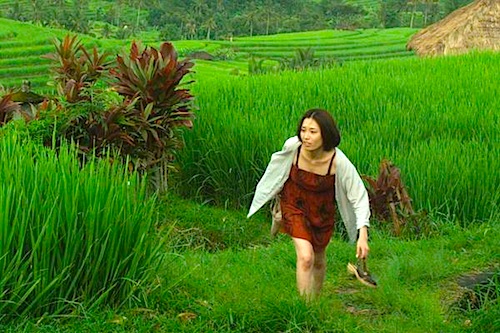By Joe Bendel. Bali is renowned for its Gamelan music and—at least in animal rights circles—notorious for its cockfights. Yuri will watch both sorts of performances on her trip. The former is much more fun, but the latter will resonate more with her, given her husband Chihiro’s terminal illness. Death will never be far from their thoughts in Kiki Sugino’s Taksu, which screens during the 2015 New York Asian Film Festival.
Already the darling of the Pan-Asian indie scene, Taksu was technically Kiki Sugino’s second film as a director, but it hit the international festival circuit just before her first premiered—with a third soon to follow. Fortunately, she also still performs as a screen thesp. After all, she is Kiki Sugino. Shrewdly, she cast herself in a major supporting role in Taksu, but it is former sex symbol Yoko Mitsuya who is asked to do the film’s heaviest lifting and rises to the occasion quite admirably.
The details are sketchy, but the words “failed transplant” says enough. Frankly, Chihiro looks done in when he and Yuri arrive in Bali. This will probably be the last time he sees his extremely pregnant sister Kumi and her Dutch husband Luke. That is a distressing fact, but they obviously have pressing issues of their own to deal with.
It is not exactly clear which stage of grief Chihiro and Yuri are on, but they are not in synch. They are both pretty freaked out, but he frequently lashes out at his naturally reserved wife, accusing her of complacency. In contrast, Yuri is profoundly exhausted and feels guilt about everything. After one of their dust-ups, she walks away, falling in with a group of Japanese expats and their beach gigolo pal, who represents the sort of commitment-free indulgence she has not experienced in some time.
There is no question Taksu will lead to more directing gigs for Sugino. It is a gorgeous looking movie, rich with sunsets and Balinese ceremonial color. It positions her as the logical successor to Cannes-favorite Naomi Kawase. That is either a good thing or a bad thing, depending on how you feel about Kawase’s contemplative films (for the record, Still the Water is considerably better than you may have heard). Sugino also takes an unhurried approach, but she burrows deeply into the psyches of Yuri and Chihiro.

Frankly, she leaves us hanging at the end, expecting a final profundity that never comes. However, for connoisseurs of slow cinema, that is a minor quibble. On the other hand, this is obviously a tough go for crass mainstream movie audiences. Still, it does have Sugino. At the risk of sounding totally fannish, she is wonderfully expressive and aptly radiant as the super-prego Kumi. The sex scenes are all Mitsuya’s, though. They are erotically charged but not exploitative. In fact, they are part-and-parcel of her inner emotional struggle. It is a powerful performance, reminiscent of some of the mature milestones of 1970s cinema that may well shock her fans.
There is indeed a good deal of sex in Taksu, but it often goes together with death. The entire cycle of life is represented in the film, as well as a nice armchair tour of Balinese cultural attractions. Sugino knew exactly what she wanted and executed the film accordingly. Nevertheless, it would not betray her aesthetic sensibilities to give her narratives more muscular definition in the future. Still, it is achingly beautiful visually and the drama is quite sensitively rendered. Recommended for slow cineastes and Sugino fans, Taksu screens this Thursday (7/2) at the Walter Reade, as part of this year’s NYAFF.
LFM GRADE: B
Posted on June 30th, 2015 at 12:38pm.